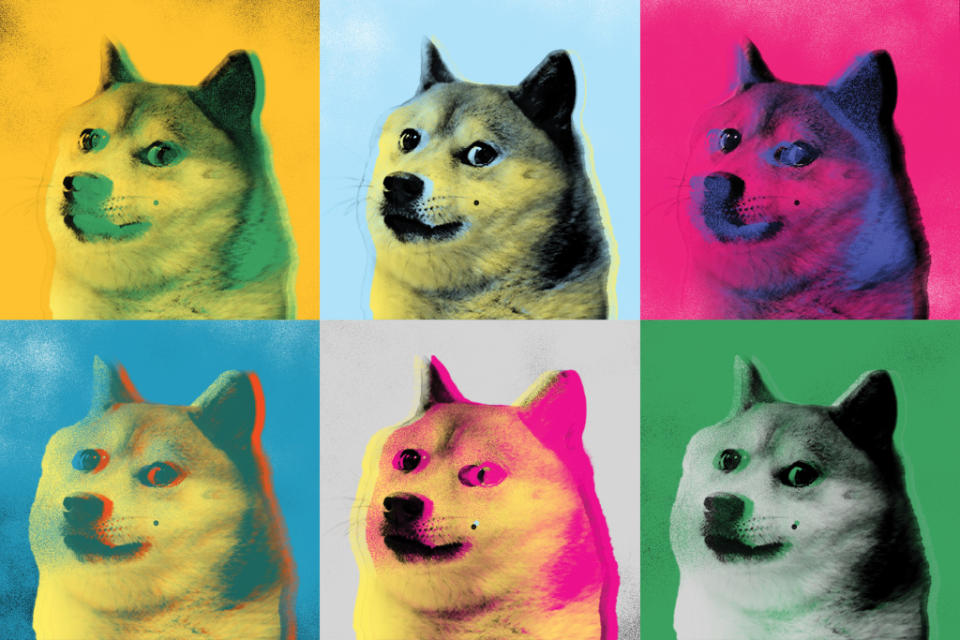Hot cryptocurrencies set off a stampede for their unlikely mascot: Shiba Inu dogs
When Zennia Barahona walks her Shiba Inu dog named Luna, passersby often stare, point their fingers, and even shout.
“People see her and say, ‘It’s the Doge dog,’” says Barahona, referring to Dogecoin, the hot cryptocurrency that features a fluffy Shibu Inu in its logo.
The recent rise of Dogecoin and its buzzy crypto cousin, Shiba Inu coin, which also uses its namesake breed as a mascot, have made Shiba Inu dogs a hot commodity. Fans of digital currencies, along with people with a nose for trends, are snapping up Shiba Inu puppies, creating a boom for the teddy bear-ish dogs that parallels the soaring cryptocurrency market.
But there's a downside to the breed's new-found popularity. Puppy mills are starting to churn out the dogs to meet the rising demand, leading to overbreeding that has translated into health complications and deformities.
Meanwhile, first-time owners are unaware of the breed’s sometimes difficult temperament. The result: Shibas are being dumped, leaving shelters and rescue organizations overwhelmed.
“This year in particular has been like no other, and we are just barely keeping our head above water here,” says Mary Bondoux, a volunteer who helps run the Colorado Shiba Inu Rescue. “I really wish cryptocurrency would find another mascot.”
Shiba Inus are an ancient breed whose history dates back to 7000 B.C., according to the American Kennel Club. Originally used as hunting dogs in Japan, Shibas first appeared in the U.S. in the 1950s. The dogs look similar to red foxes, have personalities that often resemble those of cats, and are notoriously difficult to train. Still, they're among the most popular breeds in Japan.
For most of their history in the U.S., the dogs were relatively rare. Only in the 21st century have they really become celebrities.
In 2008, a couple set up a live webcam that focused on their Shiba Inu puppies. The feed went viral for its cute factor, briefly boosting the demand for the breed.
Then, in 2013 the crypto world discovered Shiba Inus. Dogecoin, created as a joke in response to other cryptocurrencies like Bitcoin, picked the breed as its mascot, basing it off of a viral meme featuring the dog. The meme, called the "doge meme," featured a photo of a Shiba Inu giving the camera a side-eye.

Seven years later, in August of 2020, Shiba Inu coin debuted, marketing itself as the "Dogecoin killer." As such, it also adopted the Shiba Inu breed as its mascot to directly rival Dogecoin.
Both Dogecoin and Shiba Inu coin have exploded in value over the past 12 months, giving Shiba Inu dogs their moment. In late 2020, Dogecoin's value popped after Tesla CEO Elon Musk started tweeting about "Doge." He has since tweeted about the cryptocurrency several times, helping to boost the coin's value.
But Musk may have also helped Shiba Inu coin rise, simply by mentioning, well, Shiba Inus. In March, he tweeted, "I’m getting a Shiba Inu #resistanceisfutile," apparently meaning he planned to get a pet. That coupled with the surge of Dogecoin has helped increase the value and popularity of Shiba Inu coin.
Shiba advocates say the digital coins' fame has made their jobs more important than ever. Barahona, the Shiba Inu owner who is also president of NYC Shiba Rescue, took three adopted Shibas and a stack of educational pamphlets to Dogecoin’s debut party in New York City’s Financial District in 2013. She set up a table and even accepted Dogecoin as donations for the rescue at the party, attended by about 200 people and festooned with a big Shiba Inu made from of balloons.
Barahona had hoped to get the message out that Shiba Inus could be difficult to own. Because the dogs were bred to be hunters, they often reflexively chase small animals. They also can be prickly about other dogs and tend to want to be left alone rather than snuggled.
Bondoux, the Colorado rescue volunteer, says the best way to describe the breed is “dogs on the spectrum.” She implored people who are considering getting a Shiba Inu to do their research.
At NYC Shiba Rescue, the latest surge of interest in both cryptocurrencies has led to a 30% rise in applications—from hundreds of people—to adopt Shibas. COVID-19 has also helped to increase demand, part of what's known as the "pandemic dog" phenomenon.
At Colorado Shiba Inu Rescue, 300 people are on a waitlist. While that may seem like a good thing, Bondoux says 90% of those people “have no business getting a Shiba" and that "all they know is that’s the cryptocurrency dog.”
“I wish there was more consciousness and social responsibility when thinking about using the image of a dog,” Bondoux says. “If I’m going to make a dog famous, how might that impact the breed?”
Breeders are seeing the boom, too. Roki Yama Shibas, a breeding business in Wheat Ridge, Colo., says it's also experiencing a surge, with people willing to pay top dollars for the breed. A typical Shiba can cost up to $3,000, which some Shibas say is almost double what the dogs cost several years ago. “We have had an increase in requests to with people making outrageous offers to get a Shiba right away,” the group says in an email.
Michelle Gori, who shows and breeds Shibas outside of San Francisco, says she's not thrilled with how the cryptocurrencies have pushed the breed into the spotlight. She says in addition to creating an influx of Shiba shelter dogs, the trend has spurred many people to avoid reputable breeders to get their dogs faster.
Says Gori, "They want it, and they want it now."
This story was originally featured on Fortune.com
